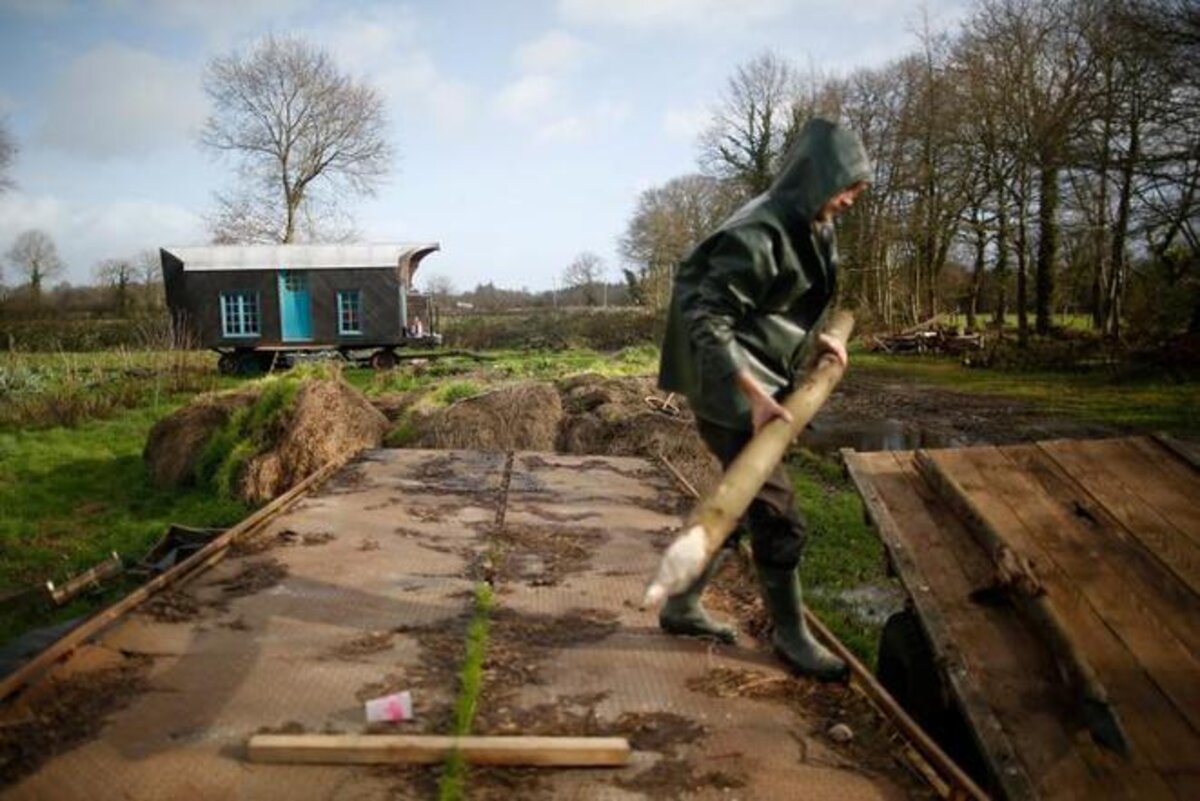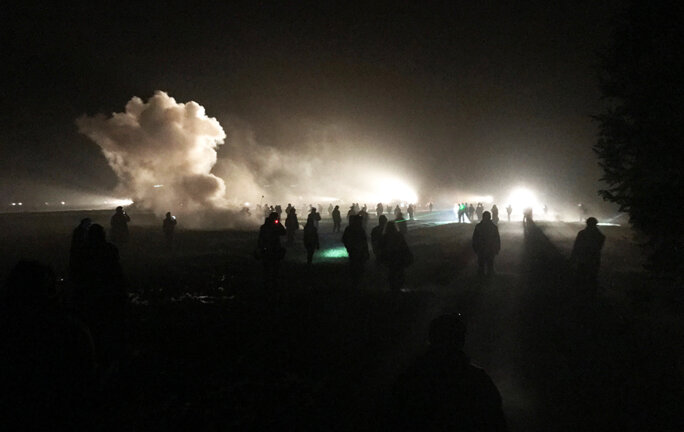For almost a decade, an area of 1,650 hectares of utilized farmland, dotted with small woods and ponds at Notre-Dame-des-Landes, situated about 25 kilometres from the town of Nantes in north-west France has been occupied by opponents of a plan to build there a vast new ‘Great West’ airport, an almost 600-million-euro project which was finally abandoned in January this year.
The green site has become emblematic for environmentalists and activists promoting an alternative agricultural economy, who established homes and farming structures in the zone, alongside the traditional farms which were previously faced with demolition to make way for the construction of the airport.
Initially a small group, the activists who moved into the site – which is dubbed a “Zone à défendre” (a “zone to be defended”), or ZAD, a neologism of the official administrative term for a site destined for future development – have built up over the lengthy occupation into a community of several hundreds.
After years of political indecision over the controversial project, which was fiercely opposed by a broad alliance of environmentalists but championed by local politicians, the government in January announced that the building of the airport, first mooted 50 years ago, was definitively abandoned.
Announcing the decision then, French Prime Minister Édouard Philippe said the plan had become “one of division” and promised “the land will recover its agricultural vocation” and that farmers already evicted would be allowed to reclaim their land. But he also warned that those he called “squatters” had until this spring to evacuate it (under French law, nobody can be evicted from their homes during the winter period), which included occupants who have built small holdings managed on alternative methods to traditional farming models.

Enlargement : Illustration 1

The government had promised those activists present on the site who had an argued project for individually mounting an agricultural enterprise in the zone would be given the possibility of continuing to stay there, pending the acceptation of their applications by the local authorities.
But on Monday this week, about 2,500 police, mostly from crowd control units, entered the site to begin evicting a number of targeted structures set up there over recent years, to the outrage of those present on the site.
Throughout Monday, and again on Tuesday, there were violent clashes between police and occupants of the site, leaving several officers and inhabitants injured. Police, who also employed hovering drones, attempted to disperse resisting protestors with stun grenades and tear gas, which was met with projectiles and, as the violence escalated on Tuesday, Molotov cocktails.
The local prefecture argued that the operation concerned structures that were occupied by those who had not filed applications for agricultural use of the land but, as Mediapart witnessed as police moved in on the zone in the early hours of Monday, the evictions included those who had indeed hoped to gain official approval of their future use of the land.
A collective farming structure called “les Cent Noms” (the one hundred names) was one of the first to be targeted on Monday. Established on the site since the spring of 2013, the eight inhabitants had been preparing to submit their candidature for an animal farm and a market garden project, but they refuse to mount the project in the name of any one individual, as demanded, in order to continue their vision of collective management. One of the farm’s inhabitants told the press that talks were underway with an agricultural mutual financing company, MSA, as part of the preparations to apply for use of the land.
“The expulsions are carried out with discernment,” said the prefecture, contacted by Mediapart on Monday, adding that, “No individual agricultural project has been presented by the Cent Noms.
Filmed by Mediapart (see video below), the eviction of the collective farm was notably heavy handed, when around 200 demonstrators who were present at the scene in a peaceful protest at the operation were subjected to pepper spray attacks by officers who, behind protective shields and pounded by mud projectiles, pushed them off the site.
During a press conference that day, the local prefect, Nicole Klein, repeated the claim that the Cent Noms farm collective had made no application for an agricultural project. But a statement by Greenpeace dismissed what it called “the absurdity” of the police operation. “To evict and threaten with destruction a site of living like the Cent Noms where, among other agricultural projects, flourishes a sheep pen and vegetable plots illustrates the absurdity of the government’s action on the ground and the incoherence of its position,” the environmental organisation said in a statement.
It was about 11.30am on Monday when a bailiff wearing protective eyewear and surrounded by some 150 gendarmes arrived at the entrance to the collective farm and announced the occupants had ten minutes to leave. After explaining that the local prefect had issued an order for their eviction, he told them, “You have no other solution than to leave the site”. Asked what would become of their belongings and animals, they were told that veterinary services would take charge of the latter and that their private possessions would be removed by a transporter. Four hours later, the farm was reduced to a pile of debris.

Enlargement : Illustration 3

“The Cent Noms is a motor that everyone recognises as having organised the zone, for facilitating relations between the different elements that compose it, for preparing the future with agricultural, intellectual and social activities,” said Marcel Thébaud, a veteran among the activists at the site involved in the alternative agricultural projects. “If the Cent Noms is destroyed, it kills hope and sows anger.”
A joint press conference was organised by the different groups occupying the zone late on Monday afternoon, when they announced that six occupants had been injured in clashes with police, notably from the detonations of stun grenades fired by police, and seven occupants had been arrested.
Dominique Lebreton, an official with the French farmers’ union la Confédération paysanne, a left-leaning organisation that promotes sustainable farming and environmentally and socially responsible agricultural policies, is a member of a committee set up to lead negotiations between the occupants of the Notre-Dame-des-Landes site and the French government. He was highly critical of the police operation that began on Monday, underlining that the inhabitants of the site espoused “a collective approach” and that the evictions had caused “a break in confidence with the prefect”.
While police began taking up positions at the site at around 3am on Monday, French interior minister Gérard Collomb announced the launch of the evictions three hours later. “We know that among the [occupants of the site] there are two groups, one which is ready to look to the future, [and] one which is there to occupy terrain and build a type of marginal life,” Collomb told Europe 1 radio in an interview later on Monday. “We can’t say how long the operation will last […] we hope things will happen in the best possible manner.”
“We will maintain the forces of law and order [there], as long as is necessary so that there is no new occupation,” he said, adding that he hoped that “in a few weeks order will be returned to Notre-Dame-des-Landes”.
-------------------------
- This is an abridged version of Mediapart's report in French which can be found here.
English version, with additional reporting, by Graham Tearse


